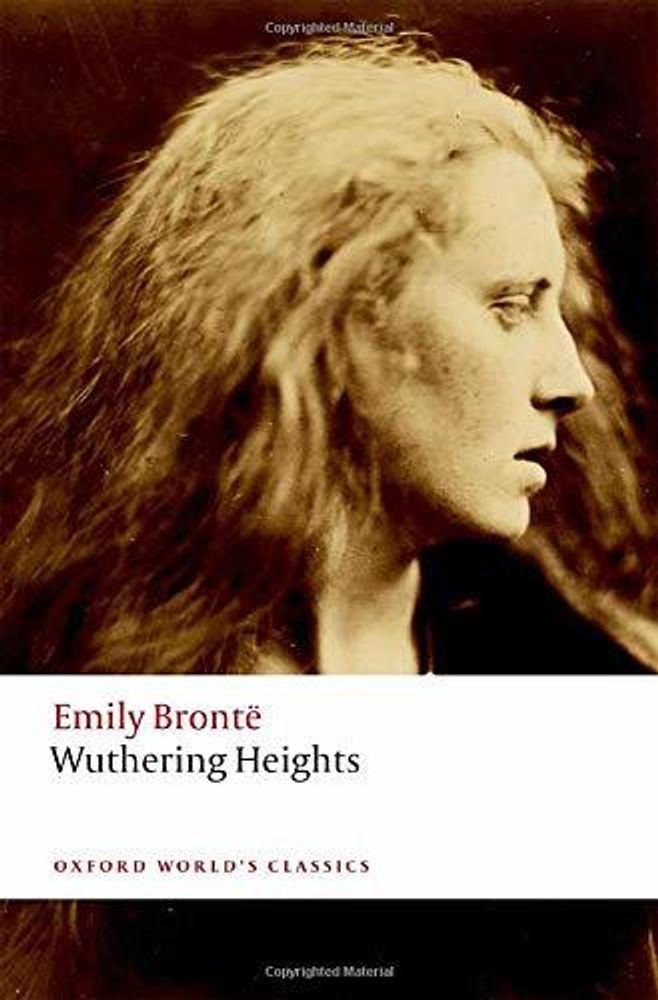'You said I killed you - haunt me, then!'
Wuthering Heights is one of the most famous love stories in the English language. It is also one of the most potent revenge narratives. The intense and unbreakable bond between the fiery Catherine Earnshaw and the foundling Heathcliff has startled and fascinated readers since its first publication
in 1847. Of uncertain parentage and ethnicity, Heathcliff comes to Wuthering Heights as a child when Catherine's father finds him wandering alone through the slave-trading port of Liverpool. After Mr Earnshaw's death, Heathcliff and Catherine find refuge in each other when the household falls into
the hands of Catherine's dissolute older brother. Their bond deepens as they escape together from the violence and stern religion of their home to the Yorkshire moors.
But the story of Catherine and Heathcliff's attachment transforms from intimacy to strife when Catherine marries the refined Edgar Linton. The ensuing story of violence and thwarted passion is one of the most powerful tales of the gothic tradition, a literary mode from which Emily Bront� wrings all
of its terrifying potential. A regional novel with a global reach, a work of sensational effects with a startling ethical core, Wuthering Heights is both a romantic melodrama and wrenching study of the difficulty of escaping from the legacies of violence.
This new edition of Emily Brontë's Wuthering Heights features a revised version of the 1976 Clarendon text, along with updated annotations, and a new introduction that situates Brontë's novel within the broader context of eighteenth- and nineteenth-century literature, and brings fresh attention to how Heathcliff's ambiguous ethnicity impacts familiar novelistic discourses of sympathy.
-
 Английский язык
Английский язык
- Английский язык
-
УЧЕБНИКИ
- УЧЕБНИКИ
-
Дошкольное образование
- Дошкольное образование
- Bebop
- Super Safari
- Playway to English
- Learning Stars
- Welcome to Our World
- Начальная школа
- Средняя и старшая школа
-
Взрослые и студенты
- Взрослые и студенты
- Open Mind
- Straightforward 2nd Ed
- Language Hub
-
Бизнес-английский
- Бизнес-английский
- In Company 3.0
- Английский по профессиям
- Active Teach
- TeamUp
- Подготовка к ОГЭ и ЕГЭ
- English Vision
- Pandy and Friends
- Target English
- Диски к учебным курсам
-
Художественная литература, альбомы, путеводители
- Художественная литература, альбомы, путеводители
- Подарочные издания
- Новинки
- Книги
- Collins Classics
- Oxford World’s Classics
- Doctor Who
- Harry Potter
- Tolkien
- Nicholas Sparks
- John Grisham
- Альбомы
- Путеводители
-
Детские игры, книги и журналы
- Детские игры, книги и журналы
- ЖУРНАЛЫ
- Usborne
-
ИГРЫ
- ИГРЫ
- StudyCraft
- КНИГИ
- First Reading Usborne
- Julia Donaldson
- Адаптированные книги
-
Дополнительные пособия, словари, грамматики
- Дополнительные пособия, словари, грамматики
- СЛОВАРИ
- ГРАММАТИКИ
- Плакаты и наглядные пособия
- СЕРИЯ IN USE
- Цифровой контент
- Ресурсы для преподавателей
- Пособия для подготовки к экзаменам
-
Нон-фикшн, академическая литература
- Нон-фикшн, академическая литература
- Нон-фикшн
-
Cambridge
- Cambridge
- IB Diploma
- Pearson
- Macmillan
- National Geographic Learning
- Oxford
- Black Cat
- Мы рекомендуем
-
 Немецкий язык
Немецкий язык
- Немецкий язык
-
HUEBER
- HUEBER
- Menschen
- KLETT
- Cornelsen
- Цифровой контент
-
Художественная литература
- Художественная литература
- Детские книги
- Remarque
- ИГРЫ
- Грамматика
-
 Французский язык
Французский язык
- Французский язык
-
Дошкольное образование и начальная школа
- Дошкольное образование и начальная школа
- Tatou le matou
- Les Petits Loustics
- Les Loustics
- Grenadine
- Ludo et ses amis NEd
- Super Max
-
Средняя и старшая школа
- Средняя и старшая школа
- Generation
- Decibel
- Adomania
- Adosphere
-
Студентам и взрослым
- Студентам и взрослым
- Edito
- Alter Ego +
- Alter Ego
- Texto
- Cosmopolite
- Международные экзамены
-
Адаптированная литература
- Адаптированная литература
- Sami et Julie
- Преподавателям
- Языковые навыки
- Грамматика
- Художественная литература
- Детские книги
- Black Cat
- Didier
- Hachette
-
 Испанский язык
Испанский язык
-
 Итальянский язык
Итальянский язык
- Итальянский язык
- Средняя и старшая школа
- Студентам и взрослым
- Адаптированная книга
-
Художественная литература
- Художественная литература
- Детские книги
- Грамматика
- Языковые навыки
- Дошкольное образование и начальная школа
- Преподавателям
-
Цифровой контент
- Цифровой контент
- Cideb\Black Cat e-readers
- ИГРЫ
-
 Русский язык
Русский язык
-
 Другие языки
Другие языки
- Другие языки
- Китайский язык
-
 SALE
SALE
- SALE
- Альбомы
- Книги
- Путеводители
-
Английский для взрослых
- Английский для взрослых
- Move
-
Английский для детей
- Английский для детей
- Playway to Eng
- Hippo and Friends
- The English Ladder
- My First Eng Adventure
- Грамматика
- Бизнес английский
- Подготовка к тестам
- Русский как иностранный
- Английский начальная школа
- Английский средняя школа
- Английский старшая школа
- Английский взрослые и студенты
-
 BOOKR
BOOKR
-
 Дополнительные товары
Дополнительные товары


